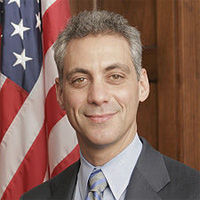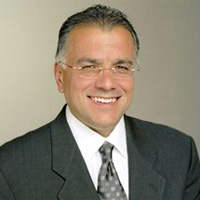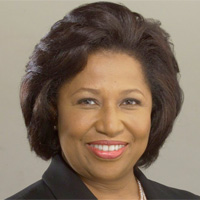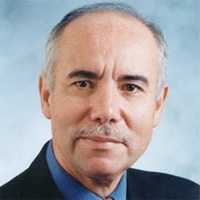| « Can't Paint with Band-Aids | In Memoriam » |
Mayor Mon Jan 17 2011
Who Sends the Somebodies? Building a Mayoral Campaign
The Mayor's race has a settled field. Four major candidates have emerged: Rahm Emanuel, Gery Chico, Carol Moseley-Braun and Miguel Del Valle. Now that they know their opponents, the campaigns are now in a furious infrastructure-building phase based on what their leadership and staff believes is their electoral Path to Victory.
"Path to victory" is a media concept, really, meant as a sort of executive summary of the realism of the strategies of a campaign's communications, field, and fundraising arms (note the absence of research and policy). The realism of a given campaign's path is subjective, and journalists often use poll numbers as a quasi-objective measure of its likelihood.
In big-city politics, these paths to victory are in practical terms processes of growing social, economic and community networks to generate cash and organizing activities -- door knocking, neighborhood meetings, get-out-the-vote (GOTV) volunteers. Each candidate is building their campaigns on these networks, jealously guarding them from other candidates and meticulously cultivating relationships within them.
This isn't about popular support. Candidates will appeal to voters only after they've built campaigns from the ground up; that goes for all the candidates. Despite the simpler narratives, none of these politicians simply flies in with a message and organizational capacity in hand. All of these candidates need to build networks of supporters through outreach to individuals and organizations that will, in the final weeks of the campaign, generate popular support from a voting public that tends to not pay attention until the last few weeks. Despite notions that voters come in foreseeable blocs, they are actually quite discerning, and no one candidate can be pigeonholed into narrative characters.
In broad strokes, these are each candidate's networks:
 Structurally speaking, Rahm Emanuel has won and is winning the big-money component of the Daley organization, along with national "centrist" or Third Way Democrats in D.C., New York and Los Angeles. This wing of the party is guided by the policy ideas embodied in Emanuel's book, The Plan. Emanuel will also win over who we can call "land-use liberals" in Chicago, essentially community and ward organizations built around protecting community identities through economic development and land use lobbying connections to City Hall (the types that support uniforming building code enforcement). Emanuel, like Daley, is also winning the support of some high-level identity-defined groups. Most notably, Juan Rangel, the pro-corporate, anti-labor CEO of the United Neighborhoods Organization, is a co-chair of his campaign. Rangel was a defender of the HDO when it existed and has publicly espoused the idea that one man's patronage is another man's networking.
Structurally speaking, Rahm Emanuel has won and is winning the big-money component of the Daley organization, along with national "centrist" or Third Way Democrats in D.C., New York and Los Angeles. This wing of the party is guided by the policy ideas embodied in Emanuel's book, The Plan. Emanuel will also win over who we can call "land-use liberals" in Chicago, essentially community and ward organizations built around protecting community identities through economic development and land use lobbying connections to City Hall (the types that support uniforming building code enforcement). Emanuel, like Daley, is also winning the support of some high-level identity-defined groups. Most notably, Juan Rangel, the pro-corporate, anti-labor CEO of the United Neighborhoods Organization, is a co-chair of his campaign. Rangel was a defender of the HDO when it existed and has publicly espoused the idea that one man's patronage is another man's networking.
 Again, structurally speaking--meaning institutions and organizations lending capacity to the campaign--Gery Chico is absorbing local big shots. Through his lobbying and law shop, Chico & Nunes, his historical connection to powerful Finance Committee Chairman Ed Burke, and his endorsement by Luis Gutierrez, possibly Chico is raising significant funds and bringing in those local heavies who likely feel a little threatened by the influx of outside power and money Emanuel represents. Rep. Gutierrez high profile as a national leader on immigration reform could help Chico raise money from national Democrats in the Hispanic Caucus and its various institutional supporters.
Again, structurally speaking--meaning institutions and organizations lending capacity to the campaign--Gery Chico is absorbing local big shots. Through his lobbying and law shop, Chico & Nunes, his historical connection to powerful Finance Committee Chairman Ed Burke, and his endorsement by Luis Gutierrez, possibly Chico is raising significant funds and bringing in those local heavies who likely feel a little threatened by the influx of outside power and money Emanuel represents. Rep. Gutierrez high profile as a national leader on immigration reform could help Chico raise money from national Democrats in the Hispanic Caucus and its various institutional supporters.
 Moseley-Braun is knitting together elements of Toni Preckwinkle's winning coalition from the Cook County Presidency primary in early 2010 with mildly independent black ward organizations and non-radical identity groups. Moseley-Braun is therefore likely to take a segment of the informal group of '70s and '80s-era lefties centered around the University of Chicago, with historic ties to Harold Washington's campaigns and the community development fights of the mid-'80s.
Moseley-Braun is knitting together elements of Toni Preckwinkle's winning coalition from the Cook County Presidency primary in early 2010 with mildly independent black ward organizations and non-radical identity groups. Moseley-Braun is therefore likely to take a segment of the informal group of '70s and '80s-era lefties centered around the University of Chicago, with historic ties to Harold Washington's campaigns and the community development fights of the mid-'80s.
 Miguel Del Valle is "the liberal" or "the progressive," meaning he'll likely end up with a significant chunk of progressive labor support (typically, this means the large, non-trade unions) and the support of ward and community organizations that derive their strength from their alliance with those large labor organizations (think Citizen Action), and scoop up the remainder of the Hyde Park Class of liberals, along with parts of Preckwinkle's coalition.
Miguel Del Valle is "the liberal" or "the progressive," meaning he'll likely end up with a significant chunk of progressive labor support (typically, this means the large, non-trade unions) and the support of ward and community organizations that derive their strength from their alliance with those large labor organizations (think Citizen Action), and scoop up the remainder of the Hyde Park Class of liberals, along with parts of Preckwinkle's coalition.
These networks are not exclusive and they don't mean that these candidates don't have diverse support. Emanuel in particular will draw on support from all parts of the city's civic leadership. But they provide the cash, message and organizational infrastructure upon which candidates build their wider campaign apparatuses. Emanuel can shake hands at El stations until he loses the rest of his fingertips, but that is not what will ultimately guide him to (not unlikely) simple majority in February. Emanuel's campaign leadership -- Rangel; David Boul, a well-known LGBT figure and Oprah producer; and until recently Mellody Hobson, who heads the mammoth Ariel Capital Management which provided crucial early help to Barack Obama's 2004 senate campaign -- provide a good snapshot of his campaign infrastructure. The Emanuel campaign staff is made up of well-known names in both national and state Democratic politics: Ben LaBolt was taken from the Obama administration; operatives like Matt Hynes, brother of Dan, Tom Bowen, Roberto Montano, and Blake Sercye have worked for high-profile pols and campaigns all over the city and state. The Emanuel campaign did not respond to a request for provide details as to how much of their cash has come from Chicago.
What's more, news of a new anti-labor PAC, For a Better Chicago, smelled a bit like a bulwark for Emanuel against labor money electing a hostile City Council. Emanuel's campaign denies any connection to FBC, but its mission jives with Emanuel's world view, inferred from his record -- Emanuel helped engineer NAFTA, said "Fuck the UAW", anxiously quashed EFCA -- that organized labor is unimportant. FBC's funder base will be the biggest institutions in the Chicagoland Chamber of Commerce, obviously no friend to labor, and its political leadership cut its teeth with Rahm and Mayor Daley.
Daley's ruling clique began to rely less on "patronage armies" and more on the city's business elite -- insurance giants, large real estate development concerns, consulting and law firms -- and specialized trade unions that rely on major municipal contracts or large-scale private sector construction projects.
This began long ago but was accelerated by the collapse of the Hispanic Democratic Organization. These influential institutions and organizations are, by definition, elite, able to raise enormous sums of money in short periods of time and able to influence opinion leaders through connections to charitable and advocacy non-profits, academia, civic and policy groups, and the media. They've always been influential; only now, they occupy almost all of the space.
This is where Gery Chico comes in. The networks undergirding Chico's campaign come from his law and lobby shop, Chico & Nunes, and his relationships to Finance Chair Ed Burke and Congressman Luis Gutierrez. Members of Burke's 14th Ward Regular Democratic Organization passed petitions for Chico's ballot access, and Chico got his start in politics working for Burke's Finance Committee. (They're also from the same neighborhood.) Chico, like Burke, is a bit of an old hand; he knows who's who and what's what up and down city government and across agencies better that probably anybody else in the race.
That status quo is endangered by a quasi-celebrity candidate like Emanuel, who draws strength from name recognition and extremely high-level connections that are beyond the average local power broker. Thus Chico gives the appearance of being a "Machine" candidate. The local media and popular perception of the "Chicago Machine" is anachronistic though; Chicago's rebirth as a "world-class city" introduced world-class money to the game, and these provincial power brokers are more vassals than warlords. Chico could therefore likely win over many of the locally influential ward and business organizations and businesses. In practical terms, that means particular neighborhoods with large numbers of middle class residents who work for city contractors, have close relationships with their alderman, and rely on relationships with city officials for the livelihood.
Chico, Burke, and Gutierrez are well-connected. This is the home team. Chico has headed up several major city agencies and departments, and Burke has 40 years of relationships in the state Democratic Party, labor, and the business community. Gutierrez was part of building the city's first independent, successful Latino political organization. But compared to a man who has worked in two immensely popular Democratic White Houses, almost became the House majority leader after three terms, carrying the endorsement of the current President (who happens to be a local guy), a stint at a major Wall Street institution, and with highly influential brothers in the entertainment (Ari) and medical (Zeke) fields, two guys from the Southwest Side are punching at a different weight. While policy may not deviate too far from the status quo ante, personnel very well may, and that's a cause for concern to people who benefit from personal relationships. According to the Chico campaign, 97% of their campaign cash has come from Chicagoland.
Del Valle's network is not necessarily shallower, but narrower. He is supported by "progressive" Latino politicians [PDF], mostly at the state level, and from ideological progressives, of the type that gave early support to Preckwinkle -- think Democracy for America or MoveOn types. The more traditional lefties, who cut their teeth in the Harold Washington administration and Council Wars eras, provide a little cash and some organizing energy. The city's progressive labor organizations, like the Teamsters Local 705, UNITE-HERE, SEIU state council, AFSCME Council 31, the Chicago Teachers Union, and UFCW Local 881, could, if they were to support Del Valle, provide big blocks of cash and organizational capacity. That may be a diminishing hope. Del Valle started his career during the neighborhood uprisings that accompanied the Washington campaign, so his connections to various community and civic groups in well-organized areas are not insignificant. Thus his support from groups like IVI-IPO and politicians like Ricardo Munoz. Del Valle may benefit from a rush of organizing activity from the political left desperate for a counter to Emanuel, whom they perceive as being wholly corporate. More than 95% of his campaign cash has come from Chicagoland. As one example, Green Party candidate for state Representative from Logan Square, Jeremy Karpen, has organized for Del Valle, collecting ballot access signatures.
Carol Moseley-Braun is the harder read. While the bulk of her popular support represented in polling comes from black voters, her campaign apparatus is murky. She hired a Republican fundraiser to raise cash, and only recently maneuvered two other major candidates, Danny Davis and Rev. James Meeks, out of the race. Moseley-Braun hasn't distinguished herself from Chico and Emanuel as much as Del Valle has, but she is certainly staked to their left. She will take (and has taken) significant blocks of ecclesiastical leadership in the African-American community, which can provide significant organizing activity. To some degree, she probably shares the Preckwinkle coalition with Del Valle and to a lesser degree Emanuel, whose connection to the President will keep him in play among Lakefront and Hyde Park liberals. On the other hand, among her senior advisors is Victor Reyes, a one-time heavy in the HDO.
Of all the candidates, Emanuel has the widest network -- it takes from a variety of groups. His circle in the Venn diagram nicks from all the other candidates. Coupled with his significant lead in fundraising and alliances with local heavies like Juan Rangel, his organizational capacity is considerably bigger than those of his opponents. Will this translate to popular support on election day?
It usually does. Campaign staffs are working furiously to expand and solidify these networks of supporters to raise money that in turn can move their message to as broad a swath of Chicagoans as possible. The individual "Paths to Victory" rest on their capacities to do so.
A disclaimer, and I'd like to stress this. These people are not supervillains nor superheroes. Nothing presented here speaks to the integrity or seriousness of these candidates as civil servants. And there's little here that touches on policy. Classical progressives may try to characterize Emanuel as a centrist plotter, but he's won support from, for example, the 48th Ward Democrats, historically a progressive organization. Characterizing Emanuel as solely a "corporate" candidate would require retroactively applying that label to state senator Barack Obama. Chico's characterization as having "Machine" backing only makes sense as a lazy generalization; all the candidates will win some support from organizations and individuals who have cooperated with or provided organizational capacity for "Machine" candidates. Chico was endorsed by Luis Gutierrez, who by any popular definition is a progressive Democrat nationally -- and if you follow that link and look at the list, one Rep. Jan Schakowsky endorsed centrist Rahm Emanuel. On questions of great relevance -- housing, crime and, perhaps most importantly, education -- the candidates will need to distinguish themselves to the voting public; their ability to do so will rely in great part on the organizational capacity they build through these networks.
UPDATE: Liz Brown of the CTU contacted GB to refute the statement that the CTU was considering endorsing Moseley-Braun over Del Valle. Brown emphasized that the CTU is still undergoing a process to determine their endorsement. From Progress Illinois:The error was mine and based on conversations with union activists who attended the Mayoral debate. I apologize for the mischaracterization.The union, she said, now wants to conduct another round of interviews with Moseley Braun, del Valle, Emanuel, Chico, William "Dock" Walls, and Patricia Van-Pelt Watkins. A CTU endorsement for del Valle and Mosely Braun would give either campaign a much-needed shot in the arm.












Maggie / January 17, 2011 12:13 PM
Chico is Chicago. He is by far the best candidate and Chicago will thrive with him as mayor. Chico is a smart lawyer and businessman, great familyman, a real native Chicagoan, has lived and worked in Chicago his entire life. He is the best candidate and has earned, deserves the job Mayor.